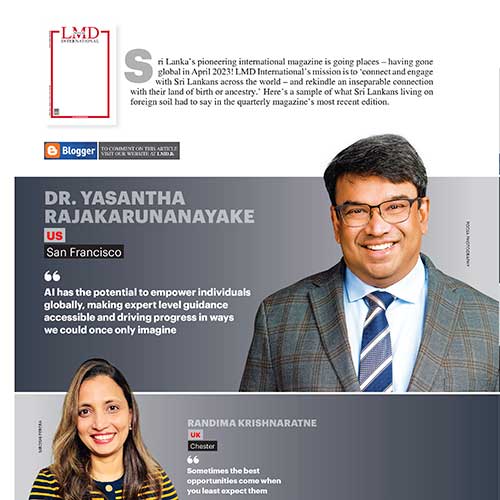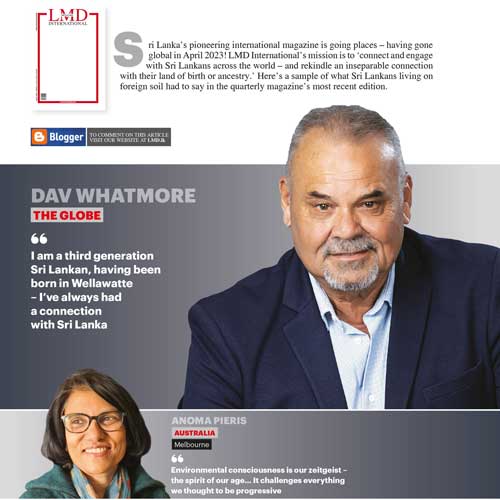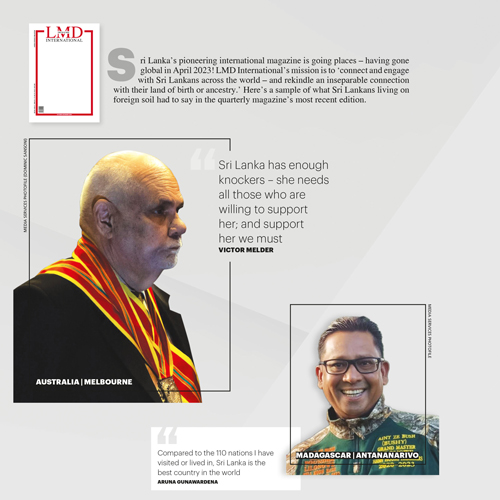SRI LANKANS OVERSEAS
FDI PROSPECTS UNDER FIRE
Rohith Senewiratne
Sri Lanka is in need of an overhaul to attract quality foreign investors
Q: As far as perceptions go, do you think Sri Lanka is capable of regaining its composure in the aftermath of the COVID-19 pandemic?
 A: The government did a very good job in controlling the pandemic when it began. Everyone commended and applauded the action taken. After a while however, it even ignored our own citizens who are working overseas and providing one of the main sources of foreign exchange.
A: The government did a very good job in controlling the pandemic when it began. Everyone commended and applauded the action taken. After a while however, it even ignored our own citizens who are working overseas and providing one of the main sources of foreign exchange.
We have to sustain ourselves and I commend the control of foreign exchange outflows – although it doesn’t have to be as harsh as it is. Hopefully, Sri Lanka can service its debts on time; and since we’re in dire need of foreign exchange, we shouldn’t antagonise our own foreign workers.
Q: So how do you perceive Sri Lanka today?
A: There are two perceptions – political and economic.
With regard to the first, Sri Lanka needs to adopt a strong foreign policy – i.e. be friendlier towards influential nations; countries that are willing to trade with us and help at this time as friends rather than loan sharks.
I’m pessimistic about future foreign investments, particularly when you don’t see fair play at the ground level. Selling assets is not the answer – we need to produce.
 O
O ur people also have to move away from the mindset of depending on the state for everything. The government needs to set strong fiscal policies, and ensure fair play, the rule of law, good infrastructure and efficient facilities. The lack of opportunity has created a dependency on government.
ur people also have to move away from the mindset of depending on the state for everything. The government needs to set strong fiscal policies, and ensure fair play, the rule of law, good infrastructure and efficient facilities. The lack of opportunity has created a dependency on government.
There’s a long list of sectors that the private sector can participate in – such as higher education, manufacturing, packaging, shipping, and reexporting and marketing to export oriented markets. However, those opportunities aren’t open to them.
Q: And how do compatriots in the US view Sri Lanka?
A: Not many Americans know about Sri Lanka. However, if any of them knows a Sri Lankan, they’d be praising the person for his or her food, lifestyle, happy-go-lucky attitude and so on.
Q: Likewise, how do other Sri Lankans living in your country of domicile view their motherland?
A: The reactions are mixed. When Gotabaya Rajapaksa returned to Sri Lanka and won the election, we had high expectations. However, if you ask anyone who has money whether they want to invest in Sri Lanka, the answer is ‘no.’
Why would you want to send dollars to do business in Sri Lanka when the rupee is falling so rapidly? You’d rather hang on to the dollars. I for one have already burnt my fingers.
Q: What were your impressions of Sri Lanka on your last visit and how much has it changed from the past?
A: As a visitor, my impression about the country will always be the same. I generally travel in tuk-tuks and love talking to the drivers – their opinions are the real heartbeat of Sri Lankans.
Whenever I’m in Colombo, I visit the Hotel De Buhari and buy biryani for myself and the tuk-tuk driver. It’s heartwarming to see his response when I offer him a packet of biryani.
Q: From afar, how do you perceive news about Sri Lanka and what mediums do you rely on to stay connected – especially during times of crisis?
A: I go to InfoLanka but mainly listen to the news and events that are shared by friends on social media. It is better to stay connected on social media than listen to the mainstream media because it’s less distorted.
 Q: How do you view the brain drain and why is there still no reversal of it, in your opinion?
Q: How do you view the brain drain and why is there still no reversal of it, in your opinion?
A: There is no reversal of the brain drain due to the lack of opportunities in Sri Lanka.
We call ourselves a ‘democratic socialist republic.’ What does that mean? Since we are opposed to having private universities, parents send their children overseas to better educate them – and they do their best to enable them to settle down in other countries.
Q: What should Sri Lanka focus on most in the coming decade?
A: Putting a stop to corruption, bringing in law and order, and ensuring that the rule of law is respected.
Q: And what are your hopes for the country in the next decade or so?
A: Nothing. As long as people like the way it’s being ruled, nothing will change.

– LMD





